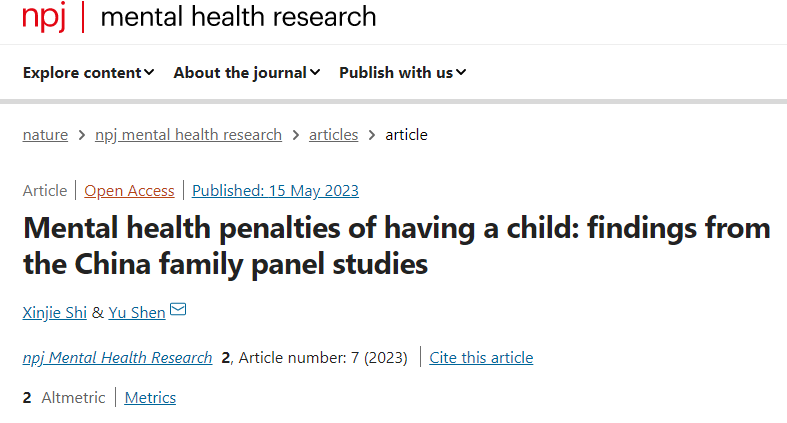浙江大学中国农村发展研究院史新杰研究员与南京财经大学沈煜博士合作撰写的论文Mental health penalties of having a child: findings from the China family panel studies被Nature旗下子刊《npj Mental Health Research》录用并在线发表。该研究是城乡机会公平系列研究成果之一,得到国家自然科学基金项目(No. 72003170; 71973061)、国家社会科学重大项目(No. 21&ZD091)、中央高校基本科研业务费、江苏省高等学校自然科学面上项目(No.21KJB630012)以及教育部人文社会科学重点研究基地重大项目(No. 22JJD790077)的资助。

文章摘要:
随着中国经济社会转型和发展,中国的生育率呈现下滑趋势,除了越来越高的“鸡娃”成本外,女性因为生育面临的较大机会成本也是一个重要因素。已有相关研究分析了生育孩子对女性带来的在劳动力市场上的“生育惩罚”,比如相较于男性而言,女性因为生育会造成就业概率降低、收入下滑等潜在风险。而本文则使用中国家庭追踪调查数据(CFPS),利用事件分析法从健康(尤其是心理健康)的视角探讨了“生育惩罚”问题。具体而言,本文发现女性生育后的第一年其生活满意度大概下降了4.3%左右,并且这种影响在生育后8-10年依旧显著;而对于男性而言,其生活满意度并没有发生显著下滑。同样地,相对男性而言,女性生育后感到“沮丧”的概率明显升高。这为生育对女性心理健康层面的“生育惩罚”提供了初步证据。同时本文发现,心理健康层面的“生育惩罚”与生理健康和劳动力市场表现的变化息息相关,同时生活在城市地区收入更高的年轻女性可能面临的机会成本更大。
In recent years, the birth rate in China has rapidly declined. While much research has been done on the penalties in earnings that women incur when they fall behind men in the labor market due to childbirth, there has been little to no research on the mental health effects. This study addresses the gap in current literature by examining the mental health penalties that women experience after having a child in comparison to men. We applied econometric modeling to data collected from China Family Panel Studies (CFPS) and found that women experienced a significant, immediate, and long-run decline (4.3%) in life satisfaction after their first child, while men were unaffected. We also found that women experienced a significant increase in depression after their first child. This suggests mental health penalties since the mental health risk proxied by these two measurements is only significant for women. This is likely related to child penalties in labor market performance and childbirth-related physical health issues. When countries adopt multiple tools to stimulate the birth rate for economic growth, they must consider the implicit burden on women—especially the long-term negative effects on mental health.


